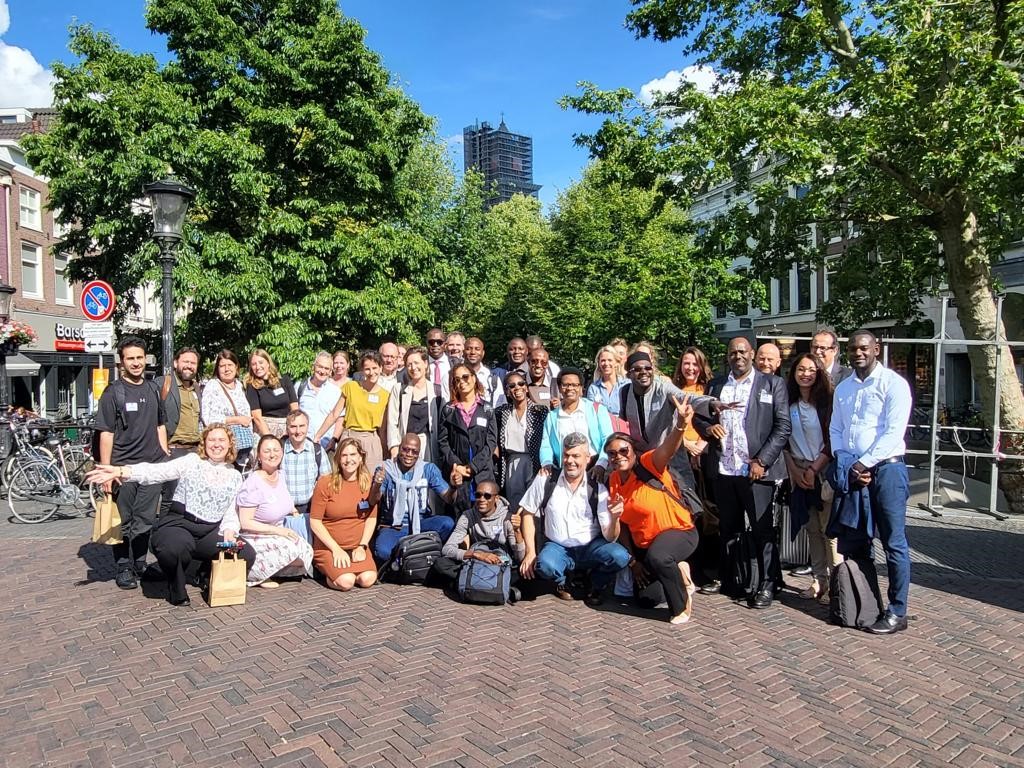The second LAND-at-scale (LAS) exchange took place from June 26th to June 28th, 2023. Sixty partners came together in Utrecht, the Netherlands to exchange lessons learned and explore common challenges. As of 2023, ten country projects are currently being implemented under the LAS program, namely Burkina Faso, Burundi, Chad, Colombia, Mali, Mozambique, the Palestinian Territories, Somalia, Rwanda and Uganda. All countries were represented and almost all implementing partners were present at the Exchange.
One of the main outcomes of the first LAS exchange in 2022 was a clear desire from project partners to learn more about the other projects within the LAS program, to learn from each other and exchange more meaningfully. Therefore, the LAS exchange will now be an annual event, followed up by quarterly virtual exchanges among project partners.
The objectives of this second LAS exchange were as follows:
- Continuing to foster the sense of community among the LAS partners;
- Becoming familiar with LAS projects and their respective intervention strategies;
- Sharing on results so far and exchanging on (common) challenges and/or lessons learned;
- Facilitating interactive and in-depth learning among project partners on key themes for
- adaptive programming and strengthening interventions;
- Deepening understanding of scaling and what this means for the LAS portfolio.
The first day of the exchange was devoted to getting to know the country projects, as all partners expressed a wish to better understand what the other projects in the program are doing. This is something that will be built on throughout the remainder of the program, where partners will come together every quarter in a virtual 'knowledge cafe'- where free and informal discussions can take place on common topics of interest.
The second day of the exchange was about 'scaling', being the central theme of the exchange as well as the LAND-at-scale program as a whole. But what do we mean by scaling? Initial discussions during the LAS exchange in 2022 showed a broadly carried consensus that for LAS partners, scaling is more than just numbers. As ‘scaling’ is such an important cornerstone of the program, a full day was devoted to communally unpack the meaning of scaling for the LAS project partners, in an attempt to come to a common definition.
RVO firstly highlighted how scaling has played a role in the design and conceptualization of the LAS program. All projects are some form of scaling in their own way. RVO analyzed these different strategies and based on commonalities, defined a first draft of a definition of scaling within the LAS program. This was followed by some discussions that confirm the need to adapt and enrich this definition, for example also to cover the risks that come with scaling.
A presentation by Wageningen University (WUR) then followed to present the Scaling Readiness approach developed by WUR and the CGIAR. This approach was developed in response to the popularization of the concept of scaling, and the association to deliver large result fast. Scaling Readiness recognizes that when working towards sustainable changes in systems (be it behavioral, institutional..), a more nuanced view is needed. For successful and sustainable scaling to happen, there are many complicating factors that play a role. There are multiple levels and spheres to take into account, competing approaches for the future and no one actor is in full control. Cees highlighted several connotations of scaling, such as ‘scaling up’ (institutionally), ‘scaling out’ (geographically/collectively), ‘scaling down’ (replacing) or ‘scaling deep’ (mental models), or even ‘cross scale’, to define intended and unintended distributional effects and trade-offs. The scaling readiness approach allows practitioners to systematically approach their scaling strategies, ‘package’ the different elements that need to be taken into consideration and thus help identify the leverages in the systems that allows for change to happen.
The Scaling Readiness approach was developed in the agriculture for development context. LAND-at-scale would like to explore whether this can be applied and adapted to land governance interventions.
MAny action points have been defined to follow up from the discussions of the exchange. It is with great pleasure that we see that this Exchange will be an Annual Event from now onwards, so all LAS partners can continue learning and reflecting together.
Many thanks to all who participated for your valuable inputs and insights.
Until next year!

